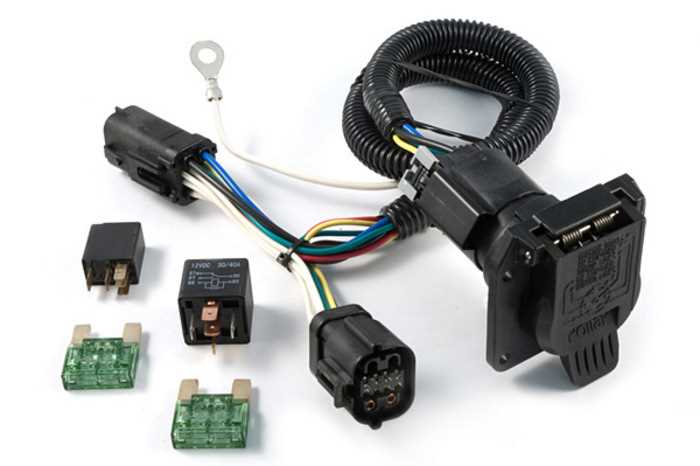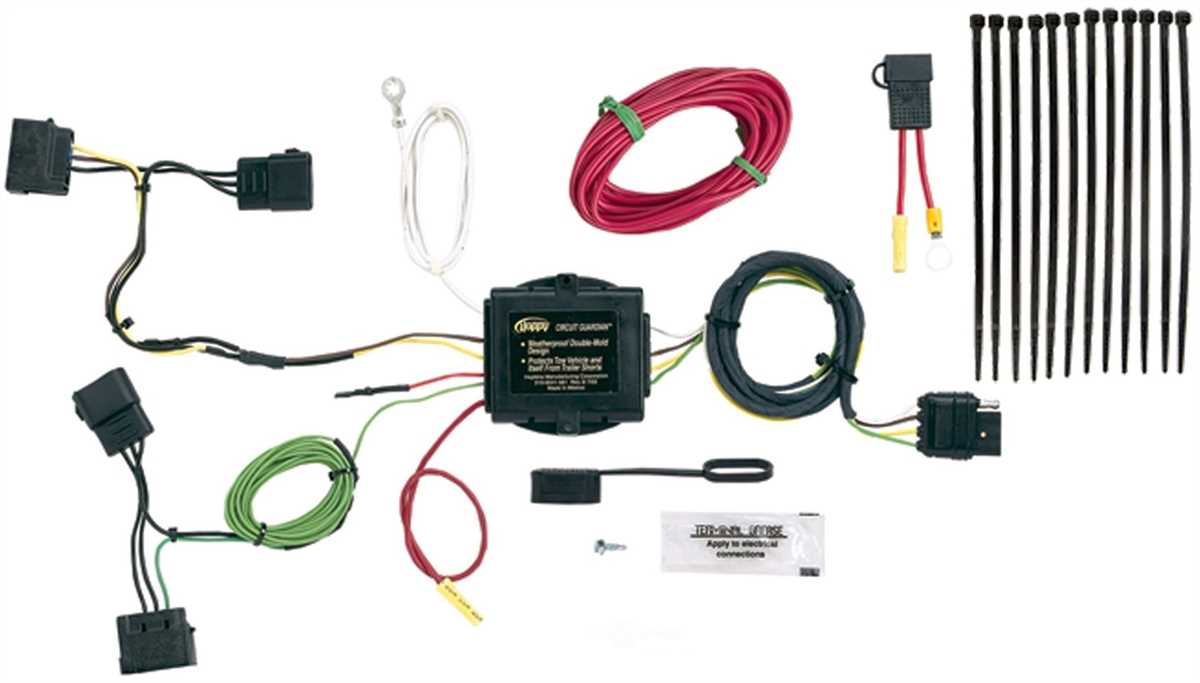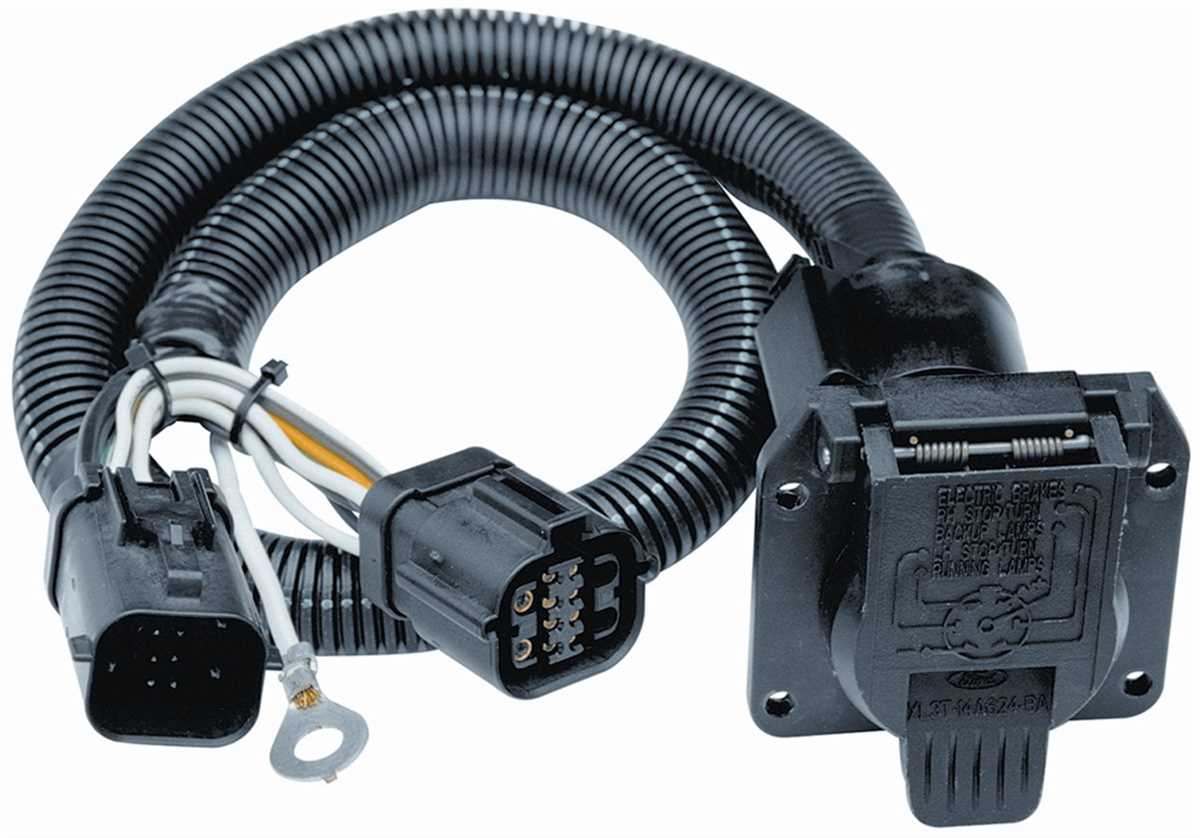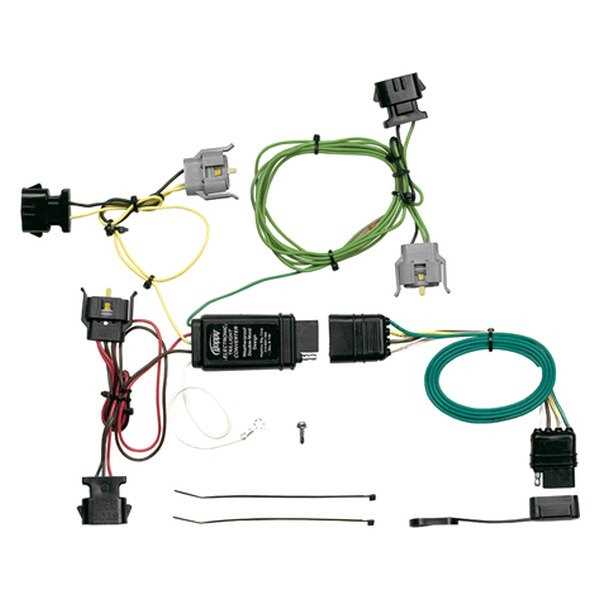
When it comes to towing a trailer with your Ford vehicle, having a reliable and properly installed trailer wiring harness is essential. A trailer wiring harness allows you to connect the electrical systems of your vehicle to the lights, brakes, and other components of your trailer, ensuring that they work in sync and comply with all safety regulations.
Whether you’re towing a boat, camper, or utility trailer, Ford offers a range of trailer wiring harness options to suit your needs. These harnesses are specifically designed to seamlessly integrate with your Ford vehicle’s existing electrical system, providing a secure and reliable connection. This not only ensures that all your trailer’s lights and brakes function properly, but it also helps protect your vehicle’s electrical system from any damage that could occur from a faulty or mismatched wiring setup.
Installing a Ford trailer wiring harness is a relatively straightforward process that can be done at home with basic tools and a little bit of know-how. The harness comes with step-by-step instructions and is designed to plug directly into your vehicle’s existing wiring connectors, eliminating the need for any cutting, splicing, or modification of your vehicle’s electrical system.
So, whether you’re planning a weekend getaway or need to haul some cargo, make sure you have the peace of mind of a properly installed Ford trailer wiring harness. Not only will it make towing safer and more convenient, but it will also help you comply with all local and federal laws regarding trailer lights and brakes. Trust Ford’s expertise and reputation for quality, and get a trailer wiring harness that is built to last and provide trouble-free performance.
Ford Trailer Wiring Harness: Everything You Need to Know
When it comes to towing with your Ford vehicle, having a reliable trailer wiring harness is essential. A trailer wiring harness allows you to connect your vehicle’s electrical system to your trailer’s lights, brakes, and other accessories, ensuring safe and reliable operation. Ford offers a range of trailer wiring harness options that are specifically designed for their vehicles, providing easy plug-and-play installation and seamless integration.
One of the key advantages of using a Ford trailer wiring harness is the convenience it offers. With a Ford trailer wiring harness, you don’t have to worry about splicing or cutting into your vehicle’s wiring system. The harness typically comes with a connector that plugs directly into your vehicle’s existing wiring harness, making installation quick and hassle-free.
Another important aspect to consider when choosing a Ford trailer wiring harness is the compatibility with your vehicle and trailer. Ford offers different wiring harnesses for different vehicle models and configurations, ensuring a perfect fit and proper functionality. It’s important to choose a wiring harness that matches your vehicle’s towing capacity and incorporates all the necessary connections, such as for the trailer’s lights, brakes, and power supply.
In addition to ensuring proper connectivity, a Ford trailer wiring harness also helps protect your vehicle’s electrical system. It provides a dedicated and isolated circuit for the trailer, minimizing the risk of overloading your vehicle’s wiring or causing any damage. This not only enhances the safety of your towing operation but also helps preserve the integrity of your vehicle’s electrical components.
Overall, investing in a Ford trailer wiring harness is a wise choice for anyone who frequently tows trailers with their Ford vehicle. It offers the convenience of easy installation, ensures proper compatibility, and provides added protection for your vehicle’s electrical system. Whether you’re towing a small utility trailer or a heavy-duty camper, a reliable trailer wiring harness is an essential accessory for any Ford owner.
What is a Trailer Wiring Harness and Why Do You Need One?

A trailer wiring harness is a device used to connect the electrical system of a vehicle to the electrical system of a trailer. It allows for the transfer of power from the vehicle to the trailer, enabling the functioning of the trailer’s lights, brakes, and other electrical components. Without a proper wiring harness, the trailer would not be able to receive power from the vehicle, making it unsafe and illegal to tow.
When towing a trailer, it is essential to have a trailer wiring harness installed on your vehicle. This is especially true for Ford vehicles, as they are designed to accommodate different towing needs. A wiring harness ensures that the lights on the trailer, such as the brake lights, turn signals, and taillights, are synchronized with the vehicle’s lights, allowing for safe and efficient communication between the two. Additionally, a wiring harness also helps to protect the vehicle’s electrical system from damage, as it prevents excessive power from flowing into the trailer’s electrical components.
There are several reasons why you might need a trailer wiring harness when towing. Firstly, it is a legal requirement in many jurisdictions to have functioning lights on your trailer. Without a wiring harness, you would not be able to connect the trailer lights to your vehicle’s electrical system, making it illegal to tow the trailer on public roads. Secondly, a wiring harness ensures that the trailer’s lights are synchronized with the vehicle’s lights, providing essential signals to other drivers on the road. This improves safety and reduces the risk of accidents caused by confusion or lack of communication between the towing vehicle and the trailer. Lastly, a wiring harness also protects your vehicle’s electrical system from damage. Without a proper harness, there is a risk of excessive power flow, which can lead to blown fuses or damaged wiring. Investing in a high-quality trailer wiring harness compatible with your Ford vehicle is crucial for a safe and hassle-free towing experience.
Benefits of Using a Ford Trailer Wiring Harness
When it comes to towing a trailer with your Ford vehicle, having a reliable trailer wiring harness is essential. A trailer wiring harness enables the electrical connectivity between your Ford vehicle and the trailer, allowing for the safe and efficient operation of lights, brakes, and other vital components. Ford trailer wiring harnesses offer several benefits that make them a wise investment for any towing needs.
1. Easy installation: A Ford trailer wiring harness is specifically designed to fit your vehicle, ensuring a perfect fit and easy installation. This eliminates the need for any modifications or complex wiring work, saving you time and hassle.
2. Improved safety: By using a Ford trailer wiring harness, you can ensure that all the necessary signals and lights on your trailer work properly. This includes brake lights, turn signals, and taillights, which are crucial for safe towing. Proper electrical connectivity ensures that other drivers can see your intentions and helps to prevent accidents on the road.
3. Durability: Ford trailer wiring harnesses are built to withstand the rigors of towing. They are designed to be weather-resistant and durable, ensuring they can handle the elements and rough conditions. This means you can rely on your trailer wiring harness to work reliably and consistently, even in harsh weather or off-road environments.
4. Compatibility: Ford trailer wiring harnesses are designed to be compatible with a wide range of Ford vehicles, making them a versatile option. Whether you have a Ford F-150, Explorer, or Mustang, there is a trailer wiring harness available to meet your towing needs. This compatibility ensures that you can easily connect and tow trailers with different electrical requirements.
In conclusion, using a Ford trailer wiring harness offers numerous benefits, including easy installation, improved safety, durability, and compatibility. Investing in a quality trailer wiring harness can enhance your towing experience and provide peace of mind knowing that your trailer and vehicle are connected electrically, allowing for safe and efficient towing.
Choosing the Right Ford Trailer Wiring Harness for Your Vehicle

When it comes to towing a trailer with your Ford vehicle, having the right wiring harness is crucial. A trailer wiring harness is responsible for connecting your vehicle’s electrical system to the trailer’s lighting and braking systems, ensuring safe and reliable operation. If you own a Ford vehicle and are looking to install a trailer wiring harness, here are a few key factors to consider.
Compatibility with Your Ford Vehicle
First and foremost, it is important to ensure that the trailer wiring harness you choose is compatible with your specific Ford vehicle. Ford offers a wide range of trailer wiring harness options, each designed to work seamlessly with various Ford models. Be sure to check the product description and specifications to confirm that the harness is designed for your vehicle’s make, model, and year.
Number and Type of Trailer Connections

Another important consideration when choosing a Ford trailer wiring harness is the number and type of trailer connections it offers. Common types of trailer connections include four-pin, six-pin, and seven-pin connectors. Determine the type of connectors your trailer requires and make sure the wiring harness you choose has the corresponding connections. Additionally, consider how many connections you need, as some harnesses may offer multiple connectors for towing different types of trailers.
Quality and Durability
When it comes to towing, safety and reliability are paramount. Therefore, it is essential to select a Ford trailer wiring harness that is made of high-quality materials and built to withstand the rigors of towing. Look for harnesses that are constructed from durable materials such as heavy-duty wiring, corrosion-resistant connectors, and weatherproof casing. Reading customer reviews and choosing reputable brands can also help ensure you are selecting a well-built and reliable harness.
Installation Ease
Lastly, consider the installation process involved with the trailer wiring harness you choose. Some harnesses require professional installation, while others are designed for easy plug-and-play installation. If you are comfortable with DIY projects, you may opt for a harness that comes with clear instructions and requires minimal tools. However, if you are unsure or not confident in your abilities, it may be wise to have the harness professionally installed to ensure proper and safe functionality.
By considering these factors, you can choose the right Ford trailer wiring harness for your vehicle, ensuring a hassle-free and safe towing experience. Remember to always prioritize compatibility, quality, and ease of installation when making your selection.
How to Install a Ford Trailer Wiring Harness

Installing a trailer wiring harness on your Ford vehicle is essential if you plan to tow a trailer. The wiring harness allows you to connect the trailer’s lights and signals to your vehicle’s electrical system, ensuring safe and legal operation while towing. Here’s a step-by-step guide on how to install a Ford trailer wiring harness:
1. Gather the necessary tools and materials:
- – Ford trailer wiring harness kit
- – Wire strippers
- – Electrical tape
- – Socket wrench
- – Screwdriver
- – Wire connectors/crimps
- – Test light or multimeter
2. Mount the trailer connector:
Locate a suitable mounting location for the trailer connector on your Ford vehicle, typically near the rear bumper. Ensure it is easily accessible and will not interfere with any moving parts. Use a screwdriver and socket wrench to secure the trailer connector in place.
3. Prepare the vehicle’s wiring:
- – Disconnect the negative terminal of the vehicle’s battery to prevent any electrical accidents.
- – Locate the vehicle’s existing wiring harness and identify the wires for the trailer’s lights and signals (typically color-coded).
- – Use wire strippers to remove a small section of insulation from the ends of these wires. Be careful not to damage the wire strands.
- – Twist the corresponding wires from the trailer wiring harness with the vehicle’s wires and secure them together using wire connectors or crimps. Repeat this step for each wire.
- – Use electrical tape to wrap each connection securely, ensuring there is no exposed wire.
4. Test the connection:
Reconnect the negative terminal of the vehicle’s battery. Use a test light or multimeter to check each wire connection for proper functionality. Turn on the vehicle’s lights and signals and verify that the trailer’s lights and signals are working correctly.
5. Secure and tidy up:
Once you have verified that the trailer wiring harness is functioning properly, secure any loose wiring using zip ties or mounting clips. Check the overall installation for any loose connections or exposed wires and make any necessary adjustments.
Following these steps will ensure a successful installation of a Ford trailer wiring harness, allowing you to tow a trailer with confidence and safety.
Troubleshooting Common Issues with Ford Trailer Wiring Harnesses
When it comes to connecting your Ford vehicle to a trailer, the wiring harness plays a crucial role in ensuring proper functioning of the trailer’s lights and electrical system. However, like any other electrical component, issues can arise with the Ford trailer wiring harness that may require troubleshooting. Here are some common problems that can occur and how to address them.
No Power to Trailer Lights
- Check the fuse: If the trailer lights are not receiving power, it could be due to a blown fuse. Locate the fuse box in your Ford vehicle and check for any blown fuses related to the trailer wiring harness.
- Inspect the wiring connections: Ensure that the wiring connections between the vehicle and the trailer are secure and free from corrosion. Clean any rust or dirt off the connectors to establish a good electrical connection.
- Test the vehicle’s towing light system: Use a multimeter to check if there is power coming from the vehicle’s towing light wiring. If there is no power, it may indicate a problem with the vehicle’s wiring system.
Intermittent or Flickering Lights
- Check for loose connections: Inspect all the wiring connections and make sure they are tight and secure. Loose connections can cause intermittent or flickering lights.
- Inspect the grounding: Ensure that the trailer’s ground wire is properly connected to a clean and unpainted metal surface on the vehicle. Poor grounding can lead to lighting issues.
- Replace faulty bulbs: If the trailer lights continue to flicker or behave inconsistently, it may be due to worn-out bulbs. Replace any faulty bulbs with new ones to restore proper functionality.
No Brake or Turn Signal Lights
- Check the vehicle’s brake and turn signal wiring: Inspect the wiring connections for the brake and turn signal lights on both the vehicle and the trailer. Look for any loose or damaged wires that may be causing the issue.
- Test the brake and turn signal relays: Use a multimeter to check if the relays responsible for the brake and turn signal lights are functioning correctly. Replace any faulty relays as needed.
- Verify the trailer’s compatibility: Ensure that the trailer’s wiring harness is compatible with your Ford vehicle. Incompatible wiring may result in brake and turn signal lights not working properly.
By troubleshooting these common issues with Ford trailer wiring harnesses, you can ensure a safe and reliable towing experience. If you are unable to resolve the problem on your own, it is recommended to consult a professional mechanic or contact Ford’s customer support for further assistance.
Additional Tips and Recommendations for Ford Trailer Wiring Harnesses
If you are planning to install a trailer wiring harness on your Ford vehicle, here are some additional tips and recommendations to keep in mind:
- Follow the instructions: Always carefully read and follow the instructions provided by the manufacturer for the specific wiring harness model you are using. This will ensure proper installation and functionality.
- Check compatibility: Make sure that the trailer wiring harness you choose is compatible with your specific Ford vehicle model and year. Different harnesses may have different wiring configurations, so it’s important to choose the right one.
- Inspect the existing wiring: Before installing the new trailer wiring harness, inspect the existing wiring on your Ford vehicle. Check for any damage, loose connections, or corroded terminals. Repair or replace any damaged components before proceeding with the installation.
- Use proper tools and equipment: Ensure that you have the necessary tools and equipment for the installation, such as wire cutters, crimping tool, and electrical tape. Using the right tools will make the installation process easier and ensure a secure and reliable connection.
- Protect the wiring: Once the trailer wiring harness is installed, make sure to secure and protect the wiring. Use zip ties or electrical tape to secure the wiring along the frame of your Ford vehicle, keeping it away from any moving parts or areas prone to heat or moisture.
- Regularly inspect and maintain: Periodically inspect the trailer wiring harness for any signs of wear or damage. This includes checking the connectors, wires, and any exposed portions. Clean and repair any issues as needed to maintain proper functionality.
By following these tips and recommendations, you can ensure a successful installation and reliable performance of your Ford trailer wiring harness. Remember to always prioritize safety and double-check your connections before towing a trailer.
Q&A:
What is a Ford trailer wiring harness?
A Ford trailer wiring harness is a set of electrical connectors and wires that allows you to connect the electrical system of your Ford vehicle to the electrical system of a trailer. It provides power to the trailer’s lights, brakes, and other electrical components.
Do all Ford vehicles come with a trailer wiring harness?
No, not all Ford vehicles come with a trailer wiring harness. Some models may come with a factory-installed trailer hitch and wiring harness, while others may require you to purchase and install a separate wiring harness.
Can I install a Ford trailer wiring harness myself?
Yes, you can install a Ford trailer wiring harness yourself if you have basic knowledge of automotive electrical systems and the necessary tools. Most wiring harnesses come with detailed instructions that will guide you through the installation process.